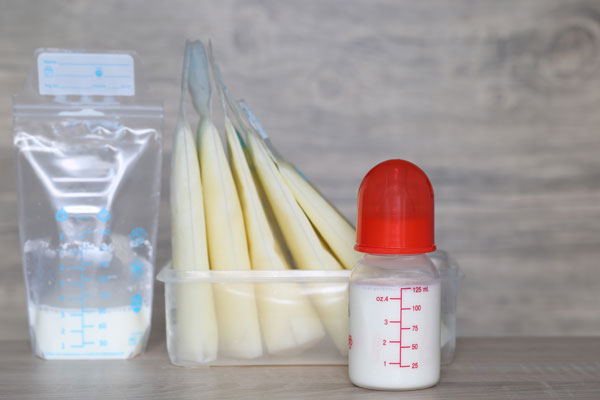First-time mothers are often intrigued by the noises produced by the baby during breastfeeding. Some of these noises are normal, while some are indicative of a problem. If your baby makes a clicking sound while breastfeeding, you need to read this article to learn more. This article will tell you about the baby’s normal vocalizations during breastfeeding, the clicking sound, and what this sound feels like. Various reasons for this sound are also discussed, along with the actions you can take to resolve issues.

Breastfeeding is a bonding time between you and your baby. It is so satisfying to watch your baby fulfilling his hunger, and the contented look on his face is priceless. However, for new mothers, breastfeeding can feel challenging and tricky as well.
It is not about just offering your breast and your baby latching on. Instead, it is learning and understanding cues from your baby. During breastfeeding, the behavior of your baby tells a lot about the different aspects of breastfeeding. He will make noises, show movements, and even cry to communicate with you.
Noises during breastfeeding
Various baby behaviors during breastfeeding convey different messages, and so do the various noises and vocalizations during nursing. Some babies feed very quietly. Mothers have to closely observe the sucking and swallowing to make sure the baby is feeding. However, for some babies, breastfeeding is quite a noisy business. They will produce various noises and vocalizations, which can mean something or cannot.
Different noises uttered by the babies during breastfeeding include:
- Humming
- Grunting
- Voice of swallowing like K-AH
- Gulping
- Gagging
- Clicking
The noises of swallowing or gulping are expected as it indicates your baby is feeding. Some baby also hums during nursing, which can be their self-soothing behavior. The noise of grunting can indicate low milk supply or constipation and difficulty in bowel movement. Gagging suggests the fast let-down or overflow of the milk.
Clicking sound while nursing
Some babies make clicking sounds when breastfeeding. It feels like noises such as breaking of the suction seal or tongue clicks during feeding. Before proceeding further, it is essential to understand what a clicking noise is.
What is the clicking noise?
Every baby can produce a slightly different sound, which can come under the category of clicking. Some mothers may misinterpret swallowing or gulping sounds like clicking. The clicking sound can also be considered as a smack or a chucking sound. Either way, it is essential to monitor the feeding of your baby closely. If the baby is losing the seal and is not sucking correctly, it signifies clicking noise and distressed feeding.
Why do babies make a clicking noise? A basic physiology
Clicking sound occurs because of the loss of seal or suction while feeding. While nursing, a baby has to extend and cup his tongue around the breast. This way, they create a seal, and then they move their tongue in a wave-like motion to suck milk from the breast. The clicking/clucking/chucking/popping sound occurs when the baby cannot make a seal and suction breaks.
There is also milk spillage with the clicking sound for some babies, which indicates that the baby is not swallowing the milk. A dimple may also appear on the baby’s cheeks. This suggests that the seal is breaking continuously, and the latch is not good.
You can make a clicking sound yourself by placing your tongue against your palate firmly and then pulling it down sharply. The sound can be different depending on the placement and pressure of your tongue against the palate. Pushing the tongue against the palate’s sides produces a different sound than the tongue pushing the palate’s front. The babies’ clicking sound is not that sharp and can be damped depending on the tongue’s position. However, listening to your sound will give you a general idea.
Thus, it is essential to identify and understand whether the baby is producing a clicking sound, or is it just the sound of swallowing or gulping.
Does clicking sound always indicate a problem?
Some babies produce clicking sounds during a few nursing sessions and won’t make any clicking sounds during other sessions. So, in this case, there is no problem. However, when the baby is always producing clicking sounds, struggles while feeding, has low diaper output, and is not gaining weight. It means clicking sound is a problem. Professional evaluation is also needed when the consistent clicking when accompanied by nipple pain, misshapen nipples after feeding, and frequent unlatching.
Reasons for clicking sound while breastfeeding
A clicking sound can occur due to minor reasons like a poor latch or a strong let-down. You can resolve these issues with a slight adjustment. However, in some cases, the clicking sound indicates a sucking problem. Effective sucking depends on the coordination of the tongue, cheeks, palate, jaw, facial muscles, and lips.
The variation or issue in the structures mentioned above can compromise the baby’s ability to feed efficiently. Below said are the various reasons for clicking sound produced by babies while nursing. ‘The Breastfeeding Mother’s Guide to Making More Milk’ by two international board-certified lactation consultants Diana West and Lisa Marasco, gives a detailed account of all these reasons.
1. Poor latching
A good latch is necessary for adequate feeding. The baby should cover more than an inch of the areola or breast tissue with his mouth. His tongue should be lying flatly in his mouth, and his body should be facing you. Both the upper and lower lips of the baby should be flared out while feeding.
If the tongue position is not correct, the baby is not properly holding the breast tissue in his mouth, or his lips are tucked in. He may feel difficulty developing suction, which leads to a clicking sound. This issue can be fixed easily. You need to adjust the baby’s position and yourself during feeding, which improves the baby’s latch.
2. Strong milk flow
A robust milk flow or overactive milk ejection reflex also leads to loss of suction. When there is milk overflow that is difficult to ingest and swallow for the baby, the baby will break the seal and let the milk flow from the side of his mouth to breathe.
Overflow and strong ejection can be resolved by adjusting your position, i.e., leaning back and relaxing. Expressing the milk before feeding sessions also helps regulate the milk flow. It also makes the feeding manageable for the baby.
3. Engorged breasts/nipples
The engorged breasts or nipples can also cause a clicking sound and makes feeding uncomfortable for both of you. Engorgement can be due to various reasons, and the most common issue is not emptying the breast or too much milk in the breasts. This is either because your baby is not feeding well or your body is producing milk more than your baby needs.
This issue can be resolved by frequently feeding your baby or expressing and pumping milk whenever feeding is not possible. Applying cold compressions can also help in relieving the discomfort. If the problem persists, consult your doctor as it can indicate breast infection, closed milk ducts, or mastitis.
4. Tongue-tie
The milk sucking action significantly depends on his ability to move his tongue without any restrictions. The baby should extend his tongue past his lower lip comfortably, and the sides of the tongue need to grasp the breast to develop a better latch. Lastly, the tip of the tongue should be lifted halfway, and the back of the tongue needs to be raised and drop to create a suction seal.
However, babies with tongue-tie cannot effectively breastfeed. The membrane that attaches the tongue’s base with the mouth is too tight, restricting the tongue mobility. Tongue-tie can occur in numerous variations and effects the baby’s sucking action accordingly. Tongue-tie leads to a poor latch, sore nipples, and clicking or popping sound during breastfeeding. If you observe any such abnormality in your baby’s mouth, immediately consult your doctor.
5. Palatal abnormalities
The problems in the shape of your baby’s palate affect his ability to create or maintain the suction, which helps keep the nipple in the mouth and sucking the milk. A typical palate is rigid from the front and gently slopes upward until it becomes soft again in the back. The palate’s sides are broad, and if you place your finger facing upward, the finger should rest comfortably in it.
6. High palate
Some babies have a high palate, which is shaped like a dome having steep sides. When you place your finger in your baby’s mouth, the top of such palate cannot be touched easily. Babies with a high palate cannot latch on the breast and gag frequently while feeding. Their positioning is shallow, leading to consistent suction breaking and the clicking sound.
Babies with a high palate can learn the proper latch and positioning. You need to encourage him to open his mouth as wide as possible, helping to grasp the breast deeply in the mouth. Tummy to tummy feeding also helps in increasing the tongue reach and grasp of the baby.
7. Cleft palate
Babies with cleft palate have an opening in the mouth’s palate, causing a hole between the nose and the mouth. There can be hard palate cleft, soft palate cleft, and submucosal soft palate cleft. The submucosal cleft is hard to detect compared to hard and soft palate cleft as it is in the back of the mouth. The cleft palate leads to difficulty grasping the breast, and the baby slips off easily on change in position. The suction breaks consistently, leading to a clicking sound during breastfeeding.
If you have observed such a problem in your baby, you need to consult your doctor to immediately resolve the issues.
8. Facial abnormalities
Non-symmetrical facial features like cleft-lips, smaller jaws, or damaged facial nerves also make it difficult for the baby to develop proper suction and milk the breast. Some babies may even don’t feed at all or go on nursing strike because sucking milk hurts.
You need to adjust your position, and special latching techniques are required to help the baby breastfeed. You can consult a lactation specialist to help you and your baby develop a customized latching position.
9. Airway problems
A baby with breathing difficulty cannot coordinate sucking and swallowing while breathing. This can lead to difficulty in sustaining a suction around the breast. The breathing problem can be because of the flu, where the secretions block the nostrils. However, there can be other issues like the narrow nasal passage or other structural abnormalities.
The nasal blockage will be resolved with time. However, positioning the baby at the breast with neck extended back can help open the airways for other airway problems. Seek medical attention if the issue persists.
10. Hypotonia
Hypotonia, low muscle tone, is common in babies with neurological issues like Down’s syndrome or Bell’s Palsy. Low muscle tone leads to difficult breastfeeding, including poor latching and sucking, inability to develop and maintain suction. There may be dimples on the baby’s cheeks while feeding because he cannot maintain suction and produce a clicking sound.
Babies with Hypotonia usually learn with age and develop muscular strength. A lactation consultant can also help you find appropriate positioning that can help your baby maintain a proper latch.
Endnote
These are some reasons that can cause a clicking sound while nursing. You first need to carefully understand if the noise your baby makes during feeding is a clicking sound. Look for the signs like milk spilling from the mouth’s side or the cheeks’ dimples while feeding. When you are sure that it is a clicking sound, look out for this sound’s causes. Adjust your position and look if your breasts are engorged. Focus on the flow of the milk and also see if your baby has a stuffy nose.
Once you ruled out fundamental issues, look for more serious problems like palate variations, facial abnormalities, or airway problems. Consult concerning medical professionals and fix the problem. Meanwhile, try to maintain your milk flow by pumping frequently and keep your baby nourished by feeding him whenever possible. Some mothers may also consider switching from breastmilk to formula milk in case of extreme difficulty. However, a baby with a poor latch will also experience difficulty in feeding via bottle. But you consult your doctor before taking any steps regarding feeding the baby.




